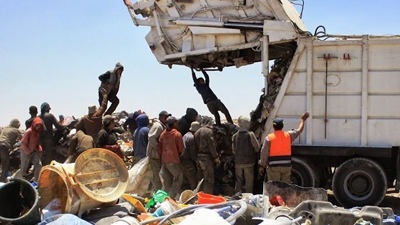Most of us don’t think twice about where our waste goes, but in the two poorest areas of the West Bank, garbage has become a public health problem.
For many years, waste was dumped in open areas. It attracted pests, and the dumps occasionally caught fire. “It truly was a public health and environmental hazard,” said Sintana Vergara, an environmental engineer at the World Bank Group. “Waste collection rates were lower than ideal. Municipalities in charge of collection weren’t able to generate a good fee collection rate, because people weren’t getting good service and were reluctant to pay. It was a vicious cycle.”
A World Bank/IFC team is now working with the governorates of Bethlehem and Hebron to break that cycle by building the first professionally managed, regionally operated landfill in the West Bank. The new facility will benefit 800,000 Palestinians, about a third of the West Bank’s population.
“This is one of the first landfill projects to use the output-based aid approach,” said Carmen Nonay, manager for the Global Partnership for Output-Based Aid (GPOBA), which mainstreams output-based aid into World Bank projects. Output-based aid gives the poor access to basic services they can’t afford, with subsidies tied to the delivery of services.
“In order to get municipalities to use the landfill, you need to make it affordable,” Nonay said.
If municipalities measurably improve services, they get a subsidy for the disposal fee at the landfill. “It’s a big innovation,” said Zoubida Allaoua, a World Bank director. “It really ups the probability of success by establishing guaranteed incentives for use.”
The other human impact
Creating a professionally managed regional sanitary landfill had clear environmental and public health benefits; but the process also required shutting down dozens of small, unregulated dumps scattered across the southern West Bank, where people scavenged for their livelihoods, picking out metal, plastic – anything with value that could be sold.
The project team met with the informal workers, known as “waste pickers.” Together, they came up with an approach in which the waste pickers could envision their own future. The United Nations Development Program, with finance from the Islamic Development Bank, managed the livelihood project and consulted with about 85 “waste pickers” to create individual, long-term livelihood plans.

